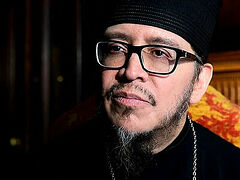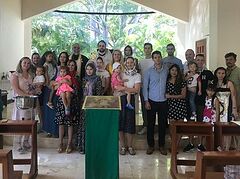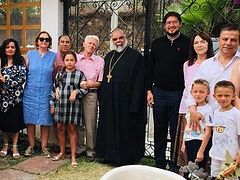Archimandrite Nektary (Haji-Petropoulos), head of the Russian Orthodox Mission in Mexico, has always tried to seek the will of God. To do this, he traveled around the globe, visited many countries, and joined Russian Orthodoxy in the United States, where he labored at the Holy Trinity Monastery in Jordanville. But he did not have a chance to stay in the Russian “Lavra Abroad” because God’s will for him was to return to Mexico and set up a Russian mission there.
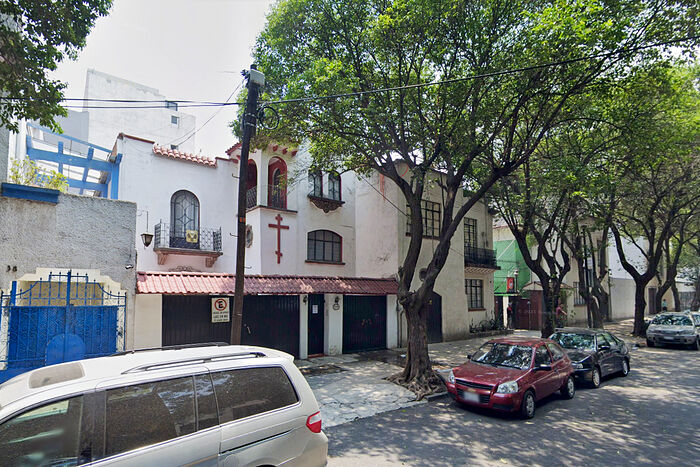 The Holy Trinity Monastery, Mexico City. Photo: Google Maps
The Holy Trinity Monastery, Mexico City. Photo: Google Maps
—Father Nektary, please tell us how you converted to Orthodoxy.
—I have Greek and Georgian roots, so I was born in the Orthodox faith and adopted it from my family. This faith has been with me since birth.
I would say that joining Russian Orthodoxy was logical for me—first of all, because I was brought up on the old or Julian Calendar, which the Russian Church adheres to. When my godfather, who was a bishop in the Greek Church, and I arrived in Mexico from Europe, the only church we could go to was Greek and belonged to the Patriarchate of Constantinople. I attended it for a while, but when I ended up in the US, I decided to look for a more traditional, Julian calendar-oriented Orthodox church.
In essence, the Russian Church Outside of Russia became the only (and the best) option for me. In America I had many friends who are its members, so I basically had no choice. But on the other hand, it was good. True, I didn’t speak Russian, but it’s just a matter of language because Orthodoxy is always Orthodoxy. And I love the Russian Church because it has more monastic traditions and a more traditional faith, as it were.
As a result, since I had always been close to the Church, I was tonsured in the Greek Church and became a hierodeacon and hieromonk in the Russian Church. I was ordained at the Holy Trinity Monastery in Jordanville a few months after my arrival there.
—How did you choose the monastic life and what does it mean to you?
— The monastic tonsure was an absolutely natural step for me. I grew up in a small family and have no siblings. I have always been very attached to the Church and wanted to be in it and serve God.
True, in Mexico we did not have a monastery, only the Greek parish which I attended with my godfather. There I was a secretary, a singer and a reader—everything that is required. But this kind of parish life was not at all what I wanted to devote myself to. So after leaving Mexico I decided to look for something greater and deeper: I wanted to join a monastery, a monastic brotherhood and learn more about Orthodoxy.
I also wanted to enter a monastery because I did not feel sufficiently prepared to answer the spiritual questions that people had. In the end, with several young people who were going to become monks, we went to other countries. We intended to establish a monastery in South America under the jurisdiction of the Greek Church, but this did not work out and I finally decided to look for Orthodoxy elsewhere. I strove for the fulfillment of God’s will and visited Greece, Serbia and Georgia. When the Patriarch of Jerusalem advised me to join ROCOR, I returned to the USA and spoke to Archbishop Kirill (Dmitriev). Vladyka received me and other members of our skete into ROCOR.
This is how we all joined Russian Orthodoxy.
After that I spoke with Vladyka again and asked for his blessing to live among Russian monks. He said it was a good idea and sent me to the Holy Trinity Monastery.
There, in Jordanville, I was ready to do whatever I might be asked to; and certainly I had the opportunity to enter the brotherhood. However, Metropolitan Laurus had other plans for me. He said: “No, no, no! You should return to Mexico and start Russian Orthodoxy there. We have nothing there, so go there, open a monastery, and found a Russian mission.”
After so many years in Mexico, this was not something I could even dream of. That seemed enough to me; I was not inclined to return as there was almost no Orthodoxy there. But Vladyka blessed me and ordained me first hierodeacon and then hieromonk.
Eventually, I was charged with the task of founding a monastery in Mexico City and opening it to Russians. It was the beginning of a new life for all of us.
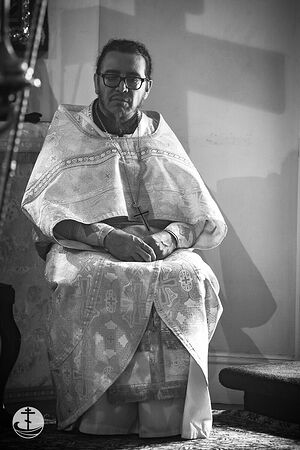 Archimandrite Nektary (Haji-Petropoulos) —Vladyka Laurus said that he felt the need to send you to Mexico during deep prayer. He understood that this was God’s will. You dreamed of staying in Jordanville and wanted to teach at the seminary there, but you accepted the hierarch’s decision as the will of God. How did you manage to come to terms with that? How did the Lord help you then, and how does He help you now?
Archimandrite Nektary (Haji-Petropoulos) —Vladyka Laurus said that he felt the need to send you to Mexico during deep prayer. He understood that this was God’s will. You dreamed of staying in Jordanville and wanted to teach at the seminary there, but you accepted the hierarch’s decision as the will of God. How did you manage to come to terms with that? How did the Lord help you then, and how does He help you now?
—By that time, I had already lived enough in the world; and although the Church was an integral part of my life, it was not the center of my activity. I taught at a college, enjoyed some renown in Mexico and was considered by some to be a very successful person for my age. But it wasn’t what I wanted. Getting degrees wasn’t my main desire—I didn’t aspire to this. Of course, I needed to study, but this was not the main goal in my life—I was ready to give it up.
Deciding to seek God’s will, I travelled to other countries and eventually ended up in Jordanville, where I hoped to join the brotherhood. Archimandrite Luke (Murianka), now a bishop, supported me and said: “This is a good idea—stay with us. Jordanville has a large community and we need people.”
However, America was not the country of my dreams. I had already lived there before, and it didn’t really matter to me. I wanted to make service to God the main thing in my life, so there were no other projects in my mind. I just wanted to try and find God’s will and accept it.
And when Vladyka Laurus said that I should return to Mexico, I immediately accepted it as an obedience, even though I had nothing there and I had no idea what exactly I should do. I was well aware that there were other Orthodox jurisdictions that have existed in this country for over a hundred years, but there was essentially no Russian church and I would have to face many difficulties.
But I, a monk, trusted God, accepting His will and knowing that He would help me solve all my problems. Of course, I had certain doubts, but there was no fear and no desire to ask the metropolitan to change his mind. I simply acted as a monk and accepted this path with humility.
—Your monastery is situated in the center of a huge city. Is it hard to remain a monk in such conditions? Does such proximity to worldly culture cause any problems?
—Of course it is difficult, because there are so many temptations everywhere. But every day we go everywhere in cassocks so people can know who we are. And we remember that we should not go to places where a monastic is not supposed to appear. We must always remember that while our feet are on earth, our thoughts are in Heaven.
To be continued…

